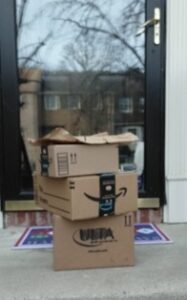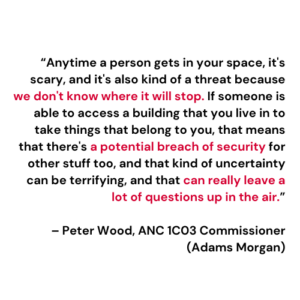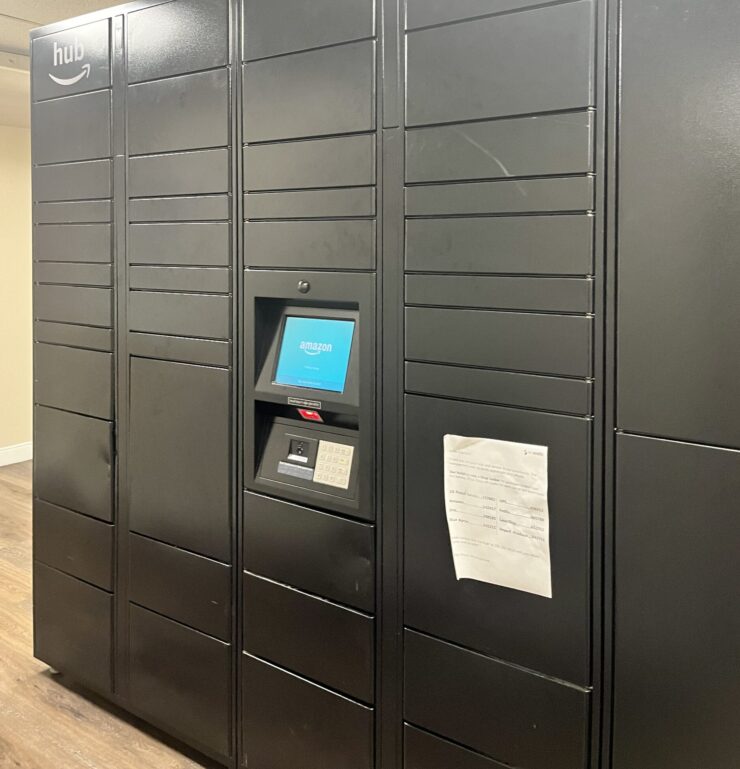D.C. was the fourth worst city for package theft in 2024, according to a report released Nov. 25 by security company Safewise.
The study ranked the “financial toll” of package theft, showing a monetary loss of $231 million in the nation’scapital alone, with just over 2 million incidents occurring in D.C. overall in 2024.
Safewise’s study comes just ahead of the 2024 holiday season, a time that sees high demand in package deliveries for holiday gifts, home decor, and stocking-stuffers. The study was followed by an announcement from Amazon on Dec. 3, announcing that this year’s Black Friday Week and Cyber Monday holiday shopping event was “its biggest ever,” breaking records nationwide.

The challenge is that with a crime of opportunity like this, it’s hard to track down a suspect, said Tom Lynch, supervisory public affairs specialist at the Metropolitan Police Department. “What has helped tremendously over the last few years is that what we see now is a lot more people have Ring doorbell cameras or just cameras on the front of their home, and that is both a deterrent, but also something that can help an investigation progress.”
Despite this rise in so-called porch piracy, local officials in D.C.’s Advisory Neighborhood Commissions say that residents can take several steps to protect their deliveries on an individual level, such as by installing cameras, communicating with neighbors, and being intentional about scheduling deliveries for times when someone is able to immediately receive them.
Daniel Michelson-Horowitz, one of the advisory neighborhood commissioners for the Adams Morgan neighborhood, acknowledged the importance of deterring porch pirates. However, he adds that solving the problem likely doesn’t land on the top of the Metropolitan Police Department’s (MPD) priority list.
“There are bigger fish to fry amongst police than chasing package thieves, and it’s a quality-of-life issue that we hope they address when they have specific evidence. But they can’t be on every block at every moment, so we need to be good partners,” Michelson-Horowitz said.
However, Peter Wood, another ANC Commissioner for Adams Morgan, said there are larger implications around porch piracy that can deeply unsettle residents and reflect larger issues in their communities.
“Anytime a person gets in your space, it’s scary, and it’s also kind of a threat because we don’t know where it will stop,” Wood said. “If someone is able to access a building that you live in to take things that belong to you, that means that there’s a potential breach of security for other stuff too, and that kind of uncertainty … can be terrifying, and that can really leave a lot of questions up in the air.”
On Nov. 25, a D.C. woman was arrested for stealing packages from an apartment building and loading them into a shopping cart, according to an official press release by the MPD.
She was charged with 2nd degree theft, a misdemeanor punishable by imprisonment for a period of no more than 180 days and/or a hefty fine.
“With the holiday shopping season approaching, MPD would like to remind the community that all seven district stations, along with the Sixth District Substation, offer Amazon lockers for residents to have their Amazon packages securely delivered to,” the release stated.
It also encouraged D.C. residents to take individual measures to prevent package theft, such as tracking deliveries online, making sure someone is at home when a package is delivered, switching delivery locations to the workplace if necessary, or seeing if the post office or store shipping the package can hold onto it until it can be picked up.
Wood said that stark economic disparities may be interconnected with porch piracy.
“Being able to address [economic inequalities] is an important way to make sure that not just in the short term, but in the long term, the city is a place that people feel comfortable living in – both for those people who are being stolen from, and people who might be inclined to start stealing,” said Wood.

In February 2016, D.C.’s Office of Victim Services and Justice Grants began the Private Security Camera Incentive Program (PSCIP), which provided assistance and incentives for “residents, businesses, non-profits and religious institutions to install security camera systems on their property.”
Participants can elect to participate in two ways.
One way is by enrolling in a voucher program, “which provides a private security camera system to eligible residents free of charge.”
It should be noted that residents are only eligible for the voucher program if they already receive public assistance through one of the following programs: General Assistance for Children; Emergency Shelter Family Services; Temporary Assistance for Needy Families; Program on Work, Employment, and Responsibility; or Interim Disability Assistance.
The other option is to enroll for a rebate program, which provides a rebate of up to $200 per camera, a maximum rebate of up to $500 per residential address, or $750 for all other eligible addresses provided that the cameras “are registered with the Metropolitan Police Department (MPD),” meaning that the footage will be continuously uploaded to the MPD’s data cloud.
“I had one nearby [apartment] complex reach out to me about getting that cap lifted, because the cost of a system for a building was higher, and I shared that with my council member,” Michelson-Horowitz said.
According to Security.org, the average indoor and outdoor security camera in the United States can start at around $50, while high-end cameras with 4K resolution and advanced features usually cost around $200 or more, not including additional hardware, data storage, and a professional home monitoring subscription.
For example, Ring’s “Protected Basic Kit” for private residences has a starting retail price of $329.99 including Ring’s annual Basic Professional Monitoring plan, while its “Indoor Business Starter Kit” begins at $479.99 including Basic Professional Monitoring.
Outside of cost, other residents and business-owners aren’t particularly inclined to give the MPD access to footage taken in and around their properties, said Commissioner Wood.
“The interesting thing is, I’ve actually never had a package stolen from my front doorstep,” said Northwest D.C. resident Maggie Parrish. “But I have roommates, and I know that a few of them have had packages stolen before, so I feel like maybe I’ve just gotten lucky, and potentially my luck will run up because I feel like almost everyone I know has had a package stolen at some point.”
Parrish said that she’s noticed older residences tend to have less options for discreet areas to leave packages, whereas newer properties tend to have bins or alcoves for mail.
“I do feel like part of that is just something that probably needs to be updated in a city that has so many people, and where package theft is an issue. But I also know that maybe it isn’t on every landlord’s mind,” Parrish said.

Wood said that most porch piracy cases are not successfully traced by the MPD, largely due to a lack of evidence. He added that many of his Adams Morgan constituents have requested that more officers be placed on foot patrol throughout the residential areas to deter potential thieves.
“As far as I know, zero do [foot patrol]. They drive around or they park. There’s mixed opinions on if they would be effective or not,” Wood said, adding that the MPD “used to come to our meetings for the public safety committee on a regular basis. They haven’t as much anymore.”
Lynch said that package theft appears to be a crime of opportunity rather than an organized, coordinated effort by groups.
He added that this year would mark the first holiday season that the MPD uses a new package theft prevention operation, in which “crime suppression team members” leave fake packages out on community members’ porches (with advance permission), wait for the package to be stolen, then use the package to track the culprit and potentially make an arrest.
Lynch said that MPD encourages residents to take part in the department’s Amazon locker program, adding that MPD is the first police department nationwide to install Amazon lockers in every single police precinct.
“We’re not really reinventing the wheel with our Amazon locker program, even though we’re the first police department to institute something like this in the country. The other thing we encourage is, if you’re not going to be home, have a neighbor or a friend come by and make sure your package is secure,” Lynch said.
In addition, experts at Safewise recommend the following practices to prevent your packages from being stolen this holiday season:
- Opt into delivery alerts.
- Require signatures.
- Make alternative arrangements, like using a personal delivery locker, asking a friend or neighbor, use a personal delivery locker on your porch, or ask that the carrier hold onto the package until you can pick it up.
- Use technology, like doorbell cams, outdoor security cameras, and full-on security systems.
- Work with your neighbors and make a plan to communicate frequently in cases of package theft to keep everyone in the loop.















Add comment